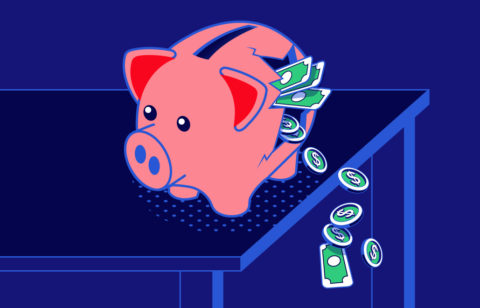It seems like everywhere you turn, there is something you’re enticed to purchase. Grocery stores purposely place impulse items next to the register so that you’re sure to see them before you’re next in line to pay. Your favorite stores send you emails announcing their latest deals. Maybe you’re dying to watch the series everyone is talking about, but downloading it costs $1.99 per episode. These little things add up to a lot of temptation.
All these superfluous purchases may drain your wallet by the end of the month. Then, how are you supposed to pay your bills? Is a little bit of instant gratification worth the price when you can’t save money or pay down your debt? If you don’t realize you’re doing this, you’re not alone.
Short-term choices can lead to long-term consequences, especially when it comes to spending and saving. For example, some of your extra money could be going toward an emergency fund. In fact, according to a recent Northwest Mutual study, 60% of Americans say they have focused on increasing their savings and improving financial habits since the COVID-19 pandemic.
Fortunately, you can learn financial self-discipline and make sounder decisions that can leave you with the money needed to cover your bills. And it doesn’t require a ton of sacrifice.
People Also Read
Here are six strategies that can help you regain control of your spending by exercising financial discipline:
1. Need vs. Want
Before making a purchase, ask yourself, “Do I need this, or do I really want it?” This isn’t the type of need you mean when you say your dog “just needs to have that blue sweater with the fire hydrant on it.” Is it something you need to survive, or can you live without it? Otherwise, the purchase can push you further into debt.
It’s also important to take care of yourself but do your best to stick to the “Need vs. Want” method.
2. Be accountable
Sometimes, you might feel like you really need an item and justify the purchase. Perhaps you’re feeling excessively tired one morning, so you stop for a $5 latte on the way to work. Instead, help yourself to a cup at home and save a bit of money.
Be accountable for the purchases you make. Frivolous purchases can often result in unnecessary spending and unwanted debt. Before you know it, you could find yourself in a brand new outfit, but without enough money to cover your necessary expenses.
3. Stick with cash
Oftentimes, credit and debit cards don’t seem like real money. A swipe here and an insert there, and you could have whatever you want. It hardly feels like you’re spending anything until that monthly bill bites you in the wallet.
If you use cash to pay for most things, you will feel your hard-earned money leaving your hands. This makes spending your money so much more real. Using only cash makes it easier to budget your spending, too. Calculate how much money you want to spend for the week and only withdraw that amount from the bank. For added convenience, you can load a debit card. When you run out of funds, the spending stops until the following week.
4. Avoid temptation
Think about the places where you spend money the most on things you don’t need. Is it the coffee shop? The mall? Perhaps shopping online is your weak spot. Consider unsubscribing from store emails or texts and browsing online purchases. By avoiding the places where you’re most vulnerable to non-essential spending, you can better control your debt and increase savings.
5. Skip expensive social events
If you meet friends for dinner and drinks regularly, you’re more likely to overspend. Going out for meals, movies, concerts, or other social events is fun, but it can be expensive. This doesn’t mean you have to avoid all social activities; look for other ways to gather with your friends such as picnics in the park or getting together at someone’s house for a game night or potluck dinner. There’s a good chance your friends will enjoy saving money too.
6. Track Everything
Impulse spending usually gets out of control because it’s easy to lose track of how much you’re spending. Whether you write in a notebook or download a budgeting app or personal finance software, recording and reviewing every purchase can open your eyes to wasteful spending. This can seem like a menial and frustrating task, but you don’t need to do it long-term. Once you know where the waste is, you can change your spending habits to eliminate or reduce it.
Self-control takes work, but it’s an important part of life and finances. Creating good financial habits and practicing self-control takes discipline. If you can keep your spending down and your savings up, you can have a healthy financial future for you and your family. In fact, spending less than you earn can help you build up your wealth and allow you to treat yourself to something special from time to time.









